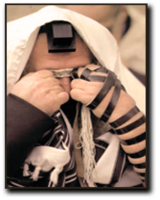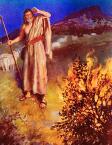A Center For Spiritual Learning
A Psalm of David.
The LORD saith unto my lord: 'Sit thou at My right hand, until I make thine enemies thy footstool.'
The LORD shall send the rod of thy strength out of Zion: rule thou in the midst of thine enemies.
PSALM 110:1&2
This translation was copied and pasted from the english section of the Mechon Mamre edition of the Tenach.
The phrazes contained in these texts seem to tell us that G-d is relating a command to someone and it will be someone who will recieve great honor from the L-rd. But wether it is speaking about Avraham avinu or King David or perhaps King David's son Shlomo hamelech or about some other person entirely remains to be addressed and we'll get to the bottom of this Psalm as we continue.
I would also like to share these scriptures with you so that those who read can understand that both men share simiularities. I'm implying to Moshiach and Moishe rabbeinu.
Moishe rabbeinu said: A prophet among you who will be "like me" him you will follow 6. "Surely I am brutish, unlike a man, and have not the understanding of a man; And I have not learned wisdom, that I should have the knowledge of the Holy One.Who hath ascended up into heaven, and descended?
Who hath gathered the wind in his fists? Who hath bound the waters in his garment?
Who hath established all the ends of the earth?
What is his name, and what is his son's name, if thou knowest"? 7
We know that Moishe ascended up to G-d and brought down the Torah, which is analagous to Moshiach who is also analogous to the manna which came down from heaven to feed his people Israel. Moshiach is the true manna not like the manna which had to be picked and eaten that same day, but the manna which once eaten gives eternal life.
So whatever proverbs 30 may say implicating Moishe rabbeinu it is also implicating Moshiach. Moishe rabbeinu is a picture of the moshiach who brought us out of exile to recieve the Torah at Har Sinai, so too the moshiach will be one who will usher in the Olam Haba and free us from the exile that we have been in for just about 2,000 years or so. I have included these texts to illustrate connections.
I would also like to add something else to this message. There is a strong apposition about a term used by Christians which arouses contention with Jews, implying that to believe in the term son of G-d when directing it to Moshiach constitutes going contrary to Torah. But it is obviously enforced to devide Judaism from Christianity, and we know that the beleif in Moshiach does not constitute a division within Torah unless Judaism has no place for Moshiach which is absurd!
Eventhough Judaism is vastly different from Christianity according to there practices, it is only because the majority of Christians are non-jews, so they will obviously look different from their counter part Judaism. Halacha teaches us that non-jews should not be practicing Jewish commands in the first place because it can create internal struggle. One only needs to reason with this to understand it's implications. Christians should not follow Jewish traditions because these practices are based on rules given to us specifically by G-d and obviously only pertaining to Jews. Christians should also not alter the commandments of G-d by introducing new ones such as following the birth of the messiah, christmas, st. Patricks day, April fools day or Easter etc etc. These are all alterations and called commandments of men and very harmful to a follower. The Torah is very precise to what should be followed and anything else we do follow should not have any religous overtones or else it will become a breech in our walk towards truth.
1. 2 Samuel Chapter 8 2. Mathew 22:41-45 3. 1 Kings 5:5 1 kings 4:25 4. 2 chronicles 12:2
5. Acts 7:54-60 6. Deuteronomy 18:15 7. Proverbs 30 8. Zechariah 14:16-20 9. Psalms 2:7
10. Exodus 4:17

The Hebrew word for son of G-d "Ben Eloikim" is not an unjewish concept. It does not go contrary to the Jewish law what so ever. It is however rejected by Jews in an attempt to hide the fact or not give alligance to the fact that Yeshua is Moshiach.
Infact, we are all G-d's creation which means we are all sons & daughters of G-d. So what is it about the term Son of G-d being implicated to Moshiach that creates such an uproar amongst Jews? Eventhough I've already explained it in other pages of this website, I will do it again just to raise the awareness of it's implications.
It's really simple. It is because they refuse to beleive in him as Moshiach that causes them to apose him. Anything we might have as proof of demonstrating him as such, will only further their apposition. This only means that we have no control over their will just as Moishe rabbeinu had no control over the will of the Pharro in allowing the children of Israel to go to the wilderness to offer up sacrifices unto G-d. This only means, one choses to accept while others chose to reject. So where is this term {son of G-d} found in Torah?
T'hillim states: I will tell of the decree: the LORD said unto me: 'Thou art My son, this day have I begotten thee. 9
Here we find a very curious expression, " G-d is telling [me] You are My son", very curious expression indeed. Then ending with the words, "this day I have begotten you". One would say that this Psalm is reffering to King David or perhaps Israel, and both arguments may be correct because since the narrator who is David, would present a logical reason for the Psalm being spoken of by G-d saying "You are my son, could actually be reffering to David or even perhaps his tribe Yihuda. Because David says: the L-rd said unto [me] and since he represents his tribe too, this is why it could be speaking of the tribe of Yihuda as well.
However, this could prove somewhat illusive, because David is actually speaking in the ruach hakodesh "the Spirit of Holliness" meaning, that it is the spirit of hashem, echad hakodesh baruch hu, who is speaking thru his mouth in a paquliar way in order to teach his people Israel. G-d is giving us a much deeper and far more reaching implication here other than it's surface meanning. So, what about Israel you ask? Could it be reffering about b'nei Yisroel?
Well, yes. No child of Israel is fully integrated to the House until he has gone thru the bris mila on the 8th day of his life. So it can be reasonable to sugguest that G-d calls every Jewish chlid his begotten son on the day of his bris mila as entering into the covenant with Him.
However logical and true the nature of these possitions are, there still exists one other possible approach. Since it could be speaking about David for being a King chosen by G-d to rule over his people Israel, and since it could also be speaking about b'nei Yisroel who are G-d's chosen people, their remains the importance of the acknowledment of "his chosen one", the Melech hamoshiach who is the corralation of [all] Israel therefore logically implicating him in this Psalm for his Honor.
To conclude with the topic of the Psalm of David in verses 2 this also makes refferance to the Moshiach reffering too as the rod of G-d and not just the rod of G-d but the word of G-d, because he will rule with rightousness and justice with Torah being the center of his ruling, because "Out of [Zion] came the Law "Torah" and the Word from Yerushalyim "Jerusalem."
We know that the word of G-d is Moshiach according to the book of John 1st chapter, we know He went forth from Yerushalayim. It was there where he was murdered, buried but ultimately rose from the grave and went to shamayim where he now sits at the right hand of his father until He makes his enemies his footstool.
When seeing this passage reffering about the "rod of thy strength" we should remember that Moses picked up the rod and used it as an extention of the stregnth of G-d to be manifestted on the land of mitzraim "Egypt" 10. So the metaphor of the rod is really a metaphor implying to the melech ha-Moshiach which is the strength Of G-d, and the sign buy which G-d has revealed his power to the whole world.
Don't forget to note, that if you'd like to enter into discussion about any topic in this website just go to my blog section, where we can discuss any issues you might have to argue about.
